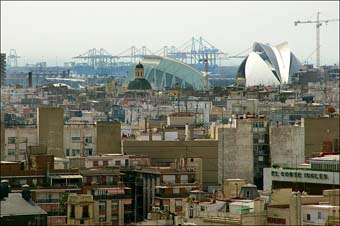
This Wednesday, 12 March, at 19:00, at the Aula Magna of the Cultural Centre La Nau it will be held the debate ‘The perverted city. A perspective about the global Valencia’, with the participation of Joan Calabuig, councillor for the Valencia City Council of PSPV-PSOE; Amadeu Sanchis, councillor for EU; Alfonso Novo, councillor for PPJoan Ribó, councillor for Compromís; and Josepa Cucó, full university professor of Social Anthropology at the University of Valencia.
The event, which will be broadcast live on MediaUni (http://mediauni.uv.es/tv) will be moderated by Antonio Ariño, Office of the Vice‐Principal for Culture and Equality at the University of Valencia, and it is part of the programme of the Open Senate, space of the debate created by the University of Valencia, through the Office of the Vice‐Principal for Culture and Equality, and this paper, with the purpose to analyse the most relevant issues of social, cultural and economics actuality.
This debate arises because of the book ‘The perverted city. A perspective about the global Valencia’ (2013, Anthropos: Barcelona), directed by Josepa Cucó and with the collaborations of Pedro García Pilán, Gil-Manuel Hernàndez -Martí, Albert Moncusí Ferré, Miguel A. Ruiz Torres, Beatriz Santamarina Campos, Francisco Torres Pérez and Teresa Yeves Bou.
The authors of this work take as a basis the urban development of the city if Valencia over the last twenty-five years to explore the impact of major urban developments both in the whole city and in the four prioritised neighbourhoods of study (Carme, Mercat, Cabanyal-Canyamelar and Penya-roja, commonly known as Avinguda de França).
Based on the concepts of assertive city/denied city, the authors address the development of the public spaces and the deployment of sociability, the dynamics of spectacle, of differentiation and social inequality, as well as the representations and expectations about the city and its neighbourhoods.
According to the author, the so-called ‘Valencian formula’, that is, of the solutions and ways to do urban planning in Valencia, highlights a project (politic) and rules (urban, fiscal, etc.) which benefited in a tiny way the urban reality of the city and the common people, but which really benefited the local economic elite and the financial capital that endorses it.
From the portal NAU XXI (http://nauxxi.uv.es) of the Office of the Vice‐Principal for Culture and Equality at the University of Valencia you can read the book introduction to be presented to the public tomorrow Wednesday.
Last update: 11 de march de 2014 10:49.
News release



















